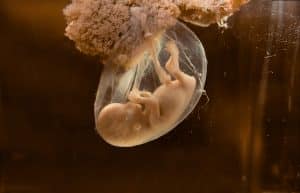
It is common knowledge that pregnant women must strictly avoid alcohol in order not to endanger the health of their baby. Many experts also advise women to avoid alcohol in the weeks before pregnancy, i.e. whenever they plan to have children, in order to prevent intrauterine growth disorders and other complications later on. For a long time, the role that the father plays in the health of the offspring was neglected. However, fathers also play a major role in the development of their unborn child, as healthy sperm cells are essential for successful conception and the proper development of the offspring. New research has now shown that it takes much longer than previously thought – more than a month – for the effects of alcohol consumption to leave the father’s sperm. It is therefore important that couples planning a pregnancy know how long in advance they need to stop drinking alcohol to avoid birth defects.
Sperm Take A Long Time to Normalize After Alcohol Consumption
Researchers at Texas A&M University have already shown that paternal drinking habits before conception can have a negative impact on fetal development. For example, sperm from men who regularly consume alcohol has an impact on placental development, brain and facial defects associated with fetal alcohol syndrome (FAS), and even the results of artificial insemination. In an article recently published in the journal Andrology, the lab of Dr. Michael Golding, professor in the Department of Veterinary Physiology and Pharmacology in the School of Veterinary Medicine & Biomedical Sciences, has now shown that it takes much longer than previously thought, more than a month, for the effects of alcohol consumption to leave the father’s sperm. The reason for this, according to the researchers, is that after abruptly quitting alcohol, the body goes through a withdrawal phase in which it has to learn to cope without the chemical. The researchers have found that a father’s sperm are also negatively affected by alcohol consumption during the withdrawal process, i.e. it takes much longer than expected for the sperm to return to normal.
Fetal Alcohol Syndrome (FAS): Also Fathers Can Put Their Offspring at Risk
One of the biggest risks associated with alcohol consumption before and during pregnancy is FAS (Fetal Alcohol Syndrome), which causes abnormal facial features, low birth weight and/or height, attention and hyperactivity problems and poor coordination. Currently, doctors only need to confirm that the mother has consumed alcohol – not the father – to diagnose a child with FAS.
For years, the man’s alcohol consumption was not considered at all. In the last five to eight years, experts have determined that there are certain conditions where there is a very strong paternal influence on alcohol exposure and fetal development. When you drink alcohol, the liver comes under oxidative stress, which causes the body to overproduce certain chemicals, which in turn disrupts normal cellular activity. Golding’s team discovered that withdrawal causes the same type of oxidative stress, extending the duration of alcohol’s effects on the body beyond what was previously thought. During withdrawal, the liver is under constant oxidative stress and sends a signal to the entire male body. The reproductive system interprets this signal and says, ‘Oh, we live in an environment that contains a really strong oxidative stress factor. I need to program the offspring to be able to adapt to this kind of environment’.” But Golding suspects that the adaptations to the sperm are not beneficial – they lead to problems like FAS. He also pointed out that it doesn’t take excessive alcohol consumption for a person to experience withdrawal. According to Golding, even consuming three to four beers after work several days a week can trigger withdrawal if the behavior stops.
Golding’s work is critical to improving pregnancy outcomes by changing the discussion about who is responsible for alcohol-related birth defects, as society has traditionally placed all the blame on mothers, even if they do not consume alcohol during pregnancy. Golding and his lab will continue to research the effects of paternal alcohol consumption to help doctors counsel couples, but in light of this groundbreaking discovery, he recommends that fathers abstain from alcohol for at least three months prior to conception.



